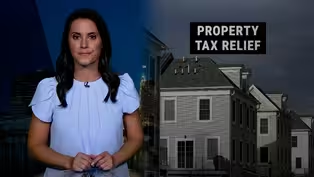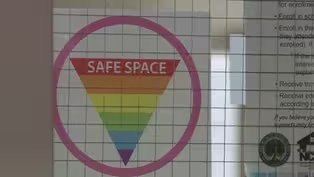NJ Spotlight News
Guardianships for those with disabilities draws debate
Clip: 10/14/2024 | 5m 33sVideo has Closed Captions
Advocates for those with disabilities want less restrictive guardianships or none at all
Guardianship is a legal process that’s handled through the courts, that gives legal authority over someone who’s unable to make decisions for themselves. And it’s often placed on individuals with intellectual or developmental disabilities.
Problems playing video? | Closed Captioning Feedback
Problems playing video? | Closed Captioning Feedback
NJ Spotlight News is a local public television program presented by THIRTEEN PBS
NJ Spotlight News
Guardianships for those with disabilities draws debate
Clip: 10/14/2024 | 5m 33sVideo has Closed Captions
Guardianship is a legal process that’s handled through the courts, that gives legal authority over someone who’s unable to make decisions for themselves. And it’s often placed on individuals with intellectual or developmental disabilities.
Problems playing video? | Closed Captioning Feedback
How to Watch NJ Spotlight News
NJ Spotlight News is available to stream on pbs.org and the free PBS App, available on iPhone, Apple TV, Android TV, Android smartphones, Amazon Fire TV, Amazon Fire Tablet, Roku, Samsung Smart TV, and Vizio.
Providing Support for PBS.org
Learn Moreabout PBS online sponsorshipFor people with intellectual or developmental disabilities, navigating the challenges of life can be a struggle.
Some turn to family for help.
Others are placed in supportive housing.
But some find themselves placed into guardianship, which gives another individual power over all their life choices, how they spend their money, where they live, or what jobs they can take.
I recently spoke with disability advocates who say these situations can lead to abuses of power.
And they're raising concerns over proposed legislation that could make guardianship easier to obtain.
If you have a guardian, that person has the right to decide everything for you.
There's very few rights that you actually retain under guardianship.
Guardianship is a legal process that's handled through the courts that gives legal authority over someone who's unable to make decisions for themselves.
Guardianship is often placed on individuals with intellectual or developmental disabilities.
People subject to guardianship will come to me and say that they don't want to be subject to guardianship anymore, or they want to have a less restrictive guardianship or a less restrictive guardian, because these tend to be abusive relationships.
Not all guardians are abusive, but it's a very easily abused system.
Disability Rights.
New Jersey represents many individuals with disabilities by fighting these guardianship cases in court.
People like Peter Brumley, who has autism and who spent three years and close to half a million dollars in court trying to get out from under his mother's petition for guardianship.
The appellate court recently filed in Peter's behalf, but it's the petition process that has him concerned for others like him.
What do you believe should be criteria to prove that guardianship is needed?
You've literally done everything you can to make your kid competent.
If you're a parent and that this person, there's literally nothing else that could work.
So literally, you'd have to prove you've tried assisted decision making and you've had powers of attorney and you've tried everything within your financial means.
I believe that my that if that were the case, my mother would have flat out not been allowed to file guardianship.
But given how easy it is to apply for guardianship and how hard it is to get out from under a request, let alone an actual guardianship appointment.
Advocates for individuals with disabilities are very concerned about a bill that's been introduced in New Jersey's legislature that would allow someone to request guardianship of a minor six months before that person turns 18.
It was introduced by Assemblyman Hal Worth and is now carried forward by its new sponsor, Assemblywoman Carol Murphy.
A lot of times are folks with disabilities who turn 18.
Once they turn 18, it's not automatic that their parents will automatically become their guardian.
So in order to help avoid that break in the guardianship, it allows the parent to continue being that child's guardian.
And if they file early before they turn the age of 18.
Essentially to keep the most vulnerable from falling into a care gap where a family can't advocate for them.
But Murphy said she has also heard concerns raised about this bill from folks worried about their loss of autonomy and even risks of abuse.
I think it's important that we also allow those people who don't need guardianship to be able to live independently and seek the kind of help that they need when they need it.
And yet this bill puts the onus on those who would have a guardianship placed over them to prove they have capacity to care for themselves.
Paul Aronsohn is New Jersey's ombudsman for individuals with intellectual or developmental disabilities and their families.
He urges caution here.
You shouldn't start from there, from the position that people are sort of guilty until proven innocent.
And, you know, if someone's seeking, you know, guardianship over another individual, I think it's incumbent upon them to make to make the case and to make it in a thoughtful way.
There's another option here, one that 22 other states have adopted, and it's called supported decision making.
But New Jersey has no clear model for it.
Peter Brunswick's father, Charles Bromley, explains what it looks like.
You signed a power of attorney to your caregiver to help them.
So.
So others banks, doctors are willing to talk to them in a higher level, like Peter has.
You have several people that you turn to for important life decisions.
Passaic County surrogate judge Zoila Casanova approves guardianship requests, and she, too, is in support of a more coordinated, centralized system that puts supported decision making before guardianship.
We should try to look at the most the least restrictive means, because ultimately and that's, again, my personal opinion, we should move forward as a state in considering how to support individuals and meet them where they are and work on their strengths with the right support rather than automatically taking away a person's rights and the autonomy.
She'd also like to see a shift away from court appointed attorneys used in these cases.
Instead, using a guardian ad litem as an advocate, someone appointed by the court to protect the rights and interests of a person who can't do it themselves.
In other states where a guardian ad litem is appointed, who's there to really assess and advocate for that individual.
That's how we actually should address this.
And maybe adding that to that bill would be a happy medium.
Murphy has said she's holding the bill while she continues to have these conversations with all stakeholders involved.
'Extremism' charges in 7th Congressional District debate
Video has Closed Captions
Clip: 10/14/2024 | 4m 42s | Sue Altman and Tom Kean Jr. label each other out of touch with constituents on key issues (4m 42s)
Most Anchor property-tax relief payments already sent out
Video has Closed Captions
Clip: 10/14/2024 | 54s | Direct deposits started on Oct. 10 (54s)
NJ Red Cross volunteers help Hurricane Milton survivors
Video has Closed Captions
Clip: 10/14/2024 | 5m 4s | Interview: Volunteer Riksum Kazi (5m 4s)
Study: Transgender students at greater risk of violence
Video has Closed Captions
Clip: 10/14/2024 | 5m | Interview: Sam Holovacs, former Sparta High School student (5m)
Train operator killed in NJ Transit crash
Video has Closed Captions
Clip: 10/14/2024 | 44s | More than 20 people were injured (44s)
Providing Support for PBS.org
Learn Moreabout PBS online sponsorshipSupport for PBS provided by:
NJ Spotlight News is a local public television program presented by THIRTEEN PBS
















